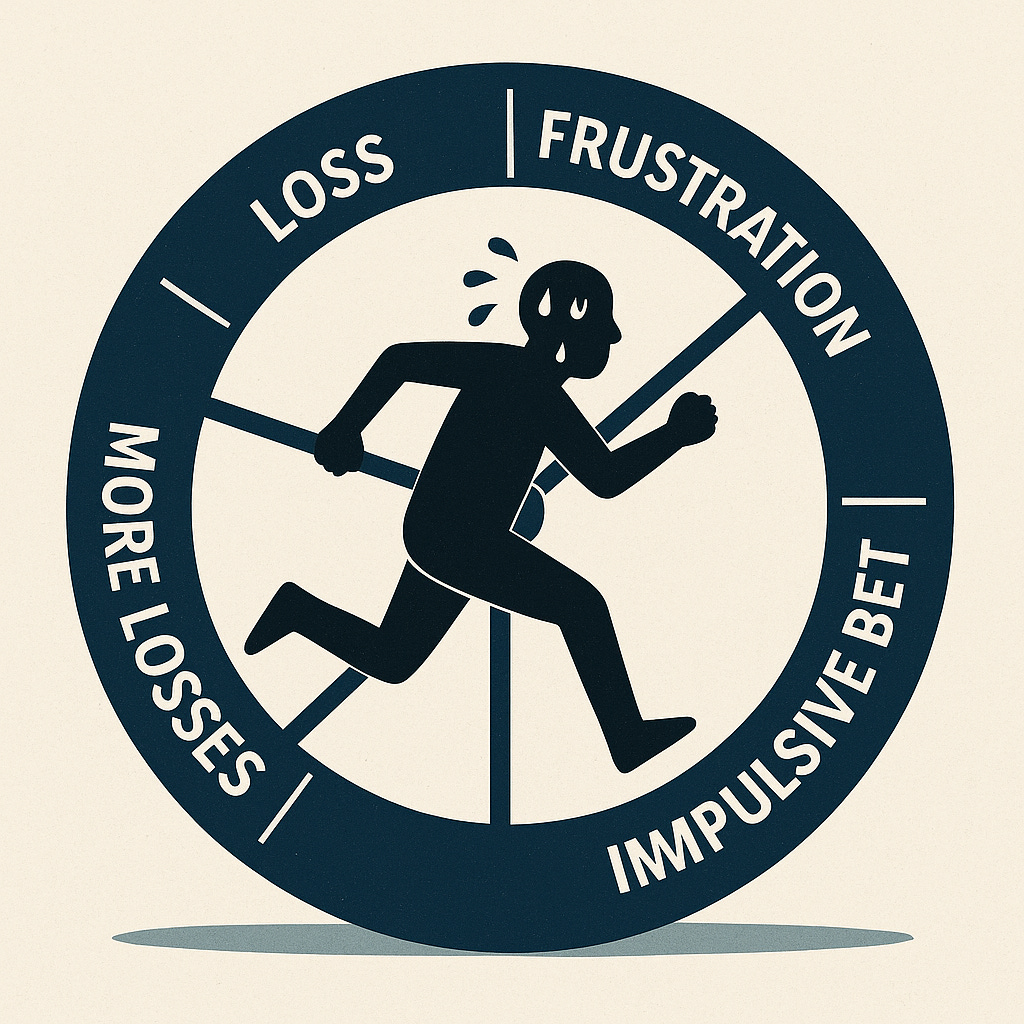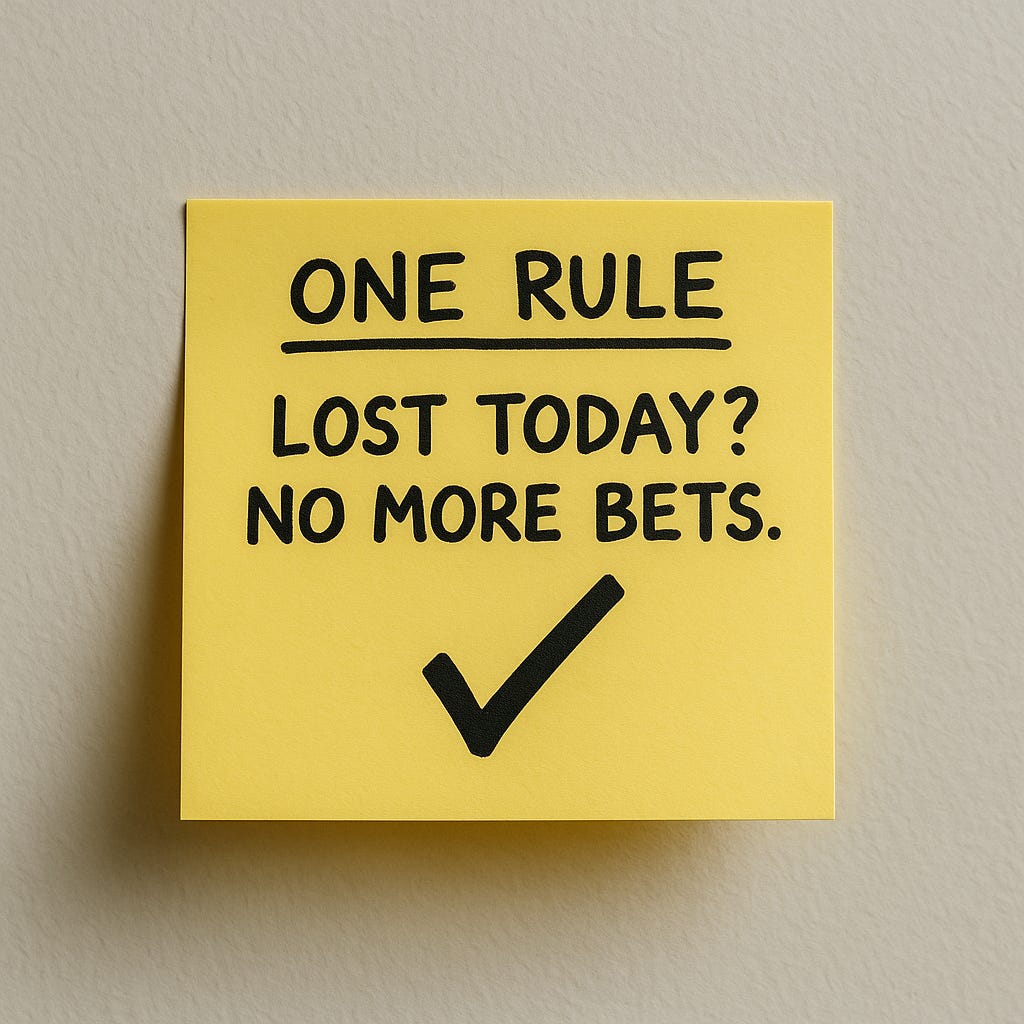Why Wins and Losses Mess With Your Mind
How gaming psychology leaks into betting.....and what to do when emotions take over
Are you chasing losses or protecting wins too hard?
Ever noticed how a small win in a game makes you feel invincible - yet a loss makes you want to double down immediately? That’s not a character flaw. It’s your brain chemistry.
Modern games - whether slots, shooters, or fantasy football - don’t just entertain. They rewire how you deal with risk, reward, and uncertainty. And if you're not aware of how this spills into your betting habits, you’re likely making decisions that feel logical… but aren’t.
🧠 How Gaming Hijacks Your Brain’s Reward System
Gaming stimulates dopamine release. The same neurochemical involved in drug addiction.
Wins light up your ventral striatum and nucleus accumbens, making you feel good and reinforcing the urge to play.
But here’s the kicker: Even losses can trigger dopamine in problem gamers. That’s how people end up chasing losses.
🎯 Near-miss effect: Slot machines and loot boxes are engineered to give you “almost wins.” Your brain reads these as partial victories, making you keep going even when you’re losing.
🧩 The Mental Traps You Fall Into
Gaming doesn’t just affect your brain chemistry - it distorts your decision logic:
1. Loss Aversion Gets Supercharged
Losses hurt more than equivalent wins feel good - up to 2.5x more.
This leads to:
Chasing losses with bigger bets
Overprotecting wins out of fear
Emotional decisions that override strategy
2. The Gambler’s Fallacy Creeps In
You believe a win is “due” after a losing streak - or that a hot streak will last forever.
This comes from emotional centers like the amygdala overpowering your logical prefrontal cortex.
3. Post-Win vs. Post-Loss Behavior
After a win: You slow down, become cautious.
After a loss: You speed up, take impulsive bets.
🧠 These aren't conscious choices. They're patterns wired into your neural response system over time.
🧍♂️ When Gaming Follows You Into Real Life
These gaming-induced decision habits don't stay in the digital world - they bleed into everyday life and betting.
Distorted risk perception: Real-world risks start to feel more predictable or controllable than they actually are.
Weakened impulse control: You might struggle to pause or reflect before reacting to stress or opportunity.
Emotional volatility: Losses in life feel unbearable, and wins feel fleeting - leading to unstable decision-making.
🎓 Especially true for:
Adolescents (underdeveloped executive function)
Adults with ADHD (heightened reward sensitivity)
Professionals under pressure (e.g., traders, entrepreneurs)
🧯 10 Evidence-Based Strategies to Avoid Tilt After Losses
Recovering from losses and avoiding tilt, a state of emotional frustration that drives poor decisions, requires both psychology and structure.
Here’s your action plan:
1. Accept Losses as Normal
Losing streaks happen - even for pros.
Acceptance reduces emotional overreaction and curbs the urge to chase.
2. Take Strategic Breaks
After a loss, walk away. Literally.
Use cooling-off periods, self-exclusion tools, or simply unplug for a few hours.
3. Stick to Your Plan
Don’t bet emotionally to “make it back.”
Follow your strategy, your rules, and your edge.
4. Manage Your Bankroll Like a Pro
Set daily loss caps (e.g., 2 units).
Risk 1–3% of your bankroll per bet.
Never top up after a bad run.
5. Track Everything in a (Bet) Journal
Record: What you bet, why you bet, who influenced it, and how you felt before/after.
Over time, this helps you identify emotional triggers, outside influences, and recurring decision patterns - so you can stop tilt before it starts.
6. Practise Emotional Regulation
You can’t stop emotions - but you can stop them from hijacking your decisions.
Techniques like deep breathing, meditation, or simply naming your emotion (“I’m frustrated about that loss”) help re-engage your logical brain and break the tilt loop.
Here are a few practical tips that work for many bettors:
Cold showers: Sounds extreme, but it works. A cold shower after a loss can physically snap you out of emotional fog and reset your focus.
No betting on the same day: Make it a rule → if you lose, you stop for the day. No exceptions. Even if it was just “bad luck,” you’re not in the clearest headspace to keep going.
These small actions help create separation between emotion and action…and that’s where better betting lives.
7. Reframe the Loss
Ask: Did I follow my process?
Use it as a learning opportunity, not a reason to spiral.
8. Set Realistic Expectations
Aim for long-term growth, not jackpot wins.
Small wins matter. They build habits and confidence.
9. Automate Limits
Set account-level limits for deposits, losses, and time spent.
Automation removes temptation in emotional moments.
10. Seek Support—You're Not Meant to Bet Alone
If you’re struggling despite these tools, talk to someone. Betting in isolation increases the risk of tilt, poor decision-making, and emotional spirals.
Instead, try joining a small community of trusted friends or fellow bettors.
Share your thought process before big bets
Talk through what went well….. and what didn’t
Hold each other accountable to bankroll rules and emotional boundaries
Share your bankrolls with pride and celebrate both wins and losses
🚩 Red Flags That You’re Tilting:
Feeling the urge to double your next stake after a loss
Betting on unfamiliar sports or random markets
Ignoring your own staking rules
Getting angry or needing to “get even”
Awareness is your first defense. Structure is your second.
🛠️ Recovery and Long-Term Brain Training
Good news: the brain can bounce back.
Prefrontal cortex function (logic and control) improves with rest and intentional habits.
Emotional regulation can be retrained with tools like CBT, journaling, and mindfulness.
Even serious gamers and bettors can rewire their decision patterns over time.
🎯 The Bottom Line
Gaming trains your brain to respond emotionally to wins and losses. And if you’re not careful, that wiring will dictate your betting.
You’re not broken. You’re just running a script your brain picked up through repetition.
✅ The solution isn’t “no more emotion”—it’s better awareness, better habits, and better systems.
🧠 Why We Built Bet Journal
If you want to stay grounded, sharp, and consistent: Bet Journal is here to help.
Log every bet with notes on emotion, influence, and logic
Spot patterns in your decision-making over time
Protect your bankroll with structured limits and smart tracking
Reflect after wins and losses to build long-term discipline
It’s not just a tracker. It’s a mindset tool.
Bet Journal app will help you take control of your betting brain.




